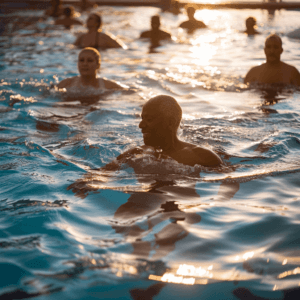Introduction: Exploring the Physical and Mental Health Advantages of Water Exercise
In today’s fast-paced world, the conversation around mental health is more critical than ever. May is Mental Health Awareness Month so it is a good time to remind ourselves to prioritize our mental health. At Alliance Chiropractic & Wellness Clinic, serving Ancaster and the Greater Hamilton area, our treatment focus is neuromusculoskeletal conditions; however, we also strive to provide resources and information to help patients make informed choices about anything impacting their quality of life. Mental health is a critical component of our overall well-being. As the warmer weather approaches, many of us will participate in water sports and recreation – let’s explore the benefits of water-based activity and their benefits on our physical and mental health.
Benefits of Aquatic Exercise
Aquatic exercises provide more than just physical health benefits—they are also a potent tool for mental rejuvenation. The buoyancy of water offers a unique, stress-reducing environment that encourages sensory calm and promotes mental wellness.
Beneficial for All Ages
In our very first blog, we highlighted the benefits of water exercises for seniors; however, the therapeutic potential of these activities extends across all age groups. Aquatic exercises provide a safe, low-impact option for enhancing physical and mental health, making it a perfect choice for families seeking to improve their overall well-being together. By incorporating water-based activities into play and exercise activities, we can promote healthy fun and habits that support all family members ranging from the youngest to the oldest.
Specific Mental Health Benefits
The positive effects of aquatic exercise on mental health is supported by robust research. A comprehensive scoping review adhering to PRISMA (Preferred Reporting Items for Systematic Reviews and Meta-Analysis) guidelines, highlighted several key benefits:
- Improved Mental Health Scores: Leisure swimmers, for example, show marked improvements in overall mental health scores, notably higher than those engaged in competitive swimming.
- Reduction in Depression and Anxiety Symptoms: Participants frequently report reduced symptoms of depression and anxiety, with some even experiencing a decreased need for medication.
- Enhanced Self-Esteem and Mood Stability: The supportive and gentle environment of water can significantly boost self-esteem and stabilize mood swings.
Sample Size and Statistical Analysis
From an initial pool of 1,635 articles, 23 studies met the reviewers’ strict inclusion criteria, including 12 randomized controlled trials. The findings across these studies consistently demonstrated (statistically significant) improvements in various mental health parameters among participants.
Population and Diversity
The benefits of aquatic exercises can be seen for individuals of all ages, fitness levels, and backgrounds, suggesting that this form of exercise is an effective conservative therapy for mental health management across general populations. In the studies reviewed, aquatic exercises provided benefits for those experiencing conditions such as depression, anxiety, mood fluctuations, and issues related to self-esteem.
Recommendations for Future Research
While the benefits are clear, further research is important. Studies should continue to fully establish the long-term effects of aquatic exercise on mental health. The specific benefits of various types of water-based activities also need to be explored – for example, winter swimming vs. leisure swimming vs. competitive swimming vs. aquatic aerobics likely provide unique advantages for participants.
Have More Questions about the Benefits of Water Exercise on Mental Wellness?
Incorporating aquatic exercises into our lifestyle routines can be beneficial for a variety of reasons including its positive effects on our mental health. At Alliance Chiropractic, we know that your health is affected by social, physical, mental, and environmental factors, and- we are committed to educating patients and promoting lifestyle habits that support all aspects of your well-being. If you have any questions or concerns related to this article or your health, contact us. If we don’t have the answer, we’ll help you find resources that do.
For those interested in learning more about aquatic fitness, the City of Hamilton offers a range of programs for all ages and fitness levels
Information for this blog was sourced from Science Direct and Decathlon Blog,

